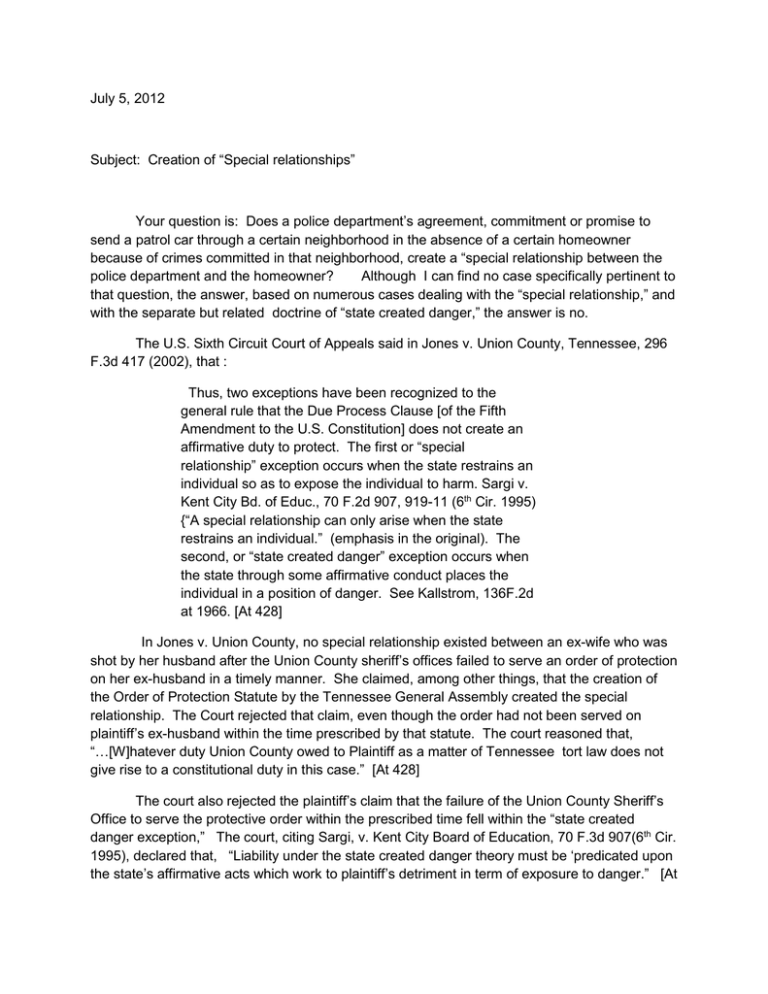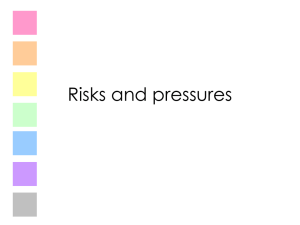July 5, 2012 Subject: Creation of “Special relationships”
advertisement

July 5, 2012
Subject: Creation of “Special relationships”
Your question is: Does a police department’s agreement, commitment or promise to
send a patrol car through a certain neighborhood in the absence of a certain homeowner
because of crimes committed in that neighborhood, create a “special relationship between the
police department and the homeowner?
Although I can find no case specifically pertinent to
that question, the answer, based on numerous cases dealing with the “special relationship,” and
with the separate but related doctrine of “state created danger,” the answer is no.
The U.S. Sixth Circuit Court of Appeals said in Jones v. Union County, Tennessee, 296
F.3d 417 (2002), that :
Thus, two exceptions have been recognized to the
general rule that the Due Process Clause [of the Fifth
Amendment to the U.S. Constitution] does not create an
affirmative duty to protect. The first or “special
relationship” exception occurs when the state restrains an
individual so as to expose the individual to harm. Sargi v.
Kent City Bd. of Educ., 70 F.2d 907, 919-11 (6th Cir. 1995)
{“A special relationship can only arise when the state
restrains an individual.” (emphasis in the original). The
second, or “state created danger” exception occurs when
the state through some affirmative conduct places the
individual in a position of danger. See Kallstrom, 136F.2d
at 1966. [At 428]
In Jones v. Union County, no special relationship existed between an ex-wife who was
shot by her husband after the Union County sheriff’s offices failed to serve an order of protection
on her ex-husband in a timely manner. She claimed, among other things, that the creation of
the Order of Protection Statute by the Tennessee General Assembly created the special
relationship. The Court rejected that claim, even though the order had not been served on
plaintiff’s ex-husband within the time prescribed by that statute. The court reasoned that,
“…[W]hatever duty Union County owed to Plaintiff as a matter of Tennessee tort law does not
give rise to a constitutional duty in this case.” [At 428]
The court also rejected the plaintiff’s claim that the failure of the Union County Sheriff’s
Office to serve the protective order within the prescribed time fell within the “state created
danger exception,” The court, citing Sargi, v. Kent City Board of Education, 70 F.3d 907(6th Cir.
1995), declared that, “Liability under the state created danger theory must be ‘predicated upon
the state’s affirmative acts which work to plaintiff’s detriment in term of exposure to danger.” [At
430] Furthermore, continued the court, “this Court, in Kallstrom also required the plaintiff to
prove that she faced a special danger form the affirmative actions of the state:”
However, because many state activities have the potential
to increase an individual’s risk of harm, we require
plaintiff’s alleging a constitutional tort under § 1983 to
show “special danger” in the absence of special
relationship between the state and either the victim or the
private tortfeasor. The victim faces “special danger” where
the state’s actions place the victim squarely at risk, as
distinguished from a risk that affects the public at large. [At
136 F.3d 1066]
Kallstrom v, City of Columbus, 136F.3d 1055 (6th Cir. 1998), above, involved the disclosure of
undercover police officer’s personnel files to counsel for alleged conspirators investigated by
the undercover officers, which disclosure the Sixth Circuit found created a “special danger” to
those officers and their families. But in Jones v. Union County, the court’s view was that,
“While the Sheriff’s Department was well aware of the seriousness of the domestic problems
involving the Plaintiff and her ex-husband, its failure to serve the ex parte order of protection did
not create or increase the danger posed to Plaintiff by her ex-husband, or place her specifically
at risk. [At 430]
Jones v. Union County illustrates how difficult it is to support a claim of a special
relationship or of special danger. It is difficult to see how the failure of a police department to
perform a neighborhood drive-through, even focusing on a particular house, rises to the level of
either. There is no “restraint” or custodial relationship between the police department and the
homeowner that is required to establish a special relationship. Likewise, the police
department’s failure in that respect does not place the homeowner “squarely at risk, as
distinguished from a risk that affects the public at large.”
Also see Hudson v. Hudson, 475 F.3d 741 (6th Cir. 2007), Doe v. Claiborne County, 103
F3d 45 (6th Cir. 1996), and cases cited therein.
But note that the court in Jones v. Union County Sheriff’s Office indicated that some
failures of a law enforcement agency to perform certain duties might rise to the level of a
violation of the Tennessee Governmental Tort Liability Act.

